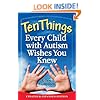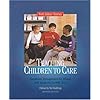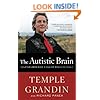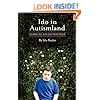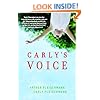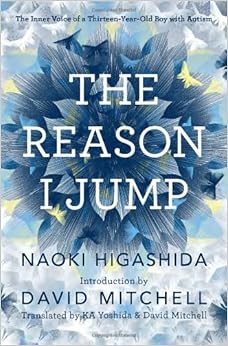




The Reason I Jump: The Inner Voice of a Thirteen-Year-Old Boy with Autism Hardcover – August 27, 2013

Don't have a Kindle? Get your Kindle here, or download a FREE Kindle Reading App.
Step right into Neil Patrick Harris's shoes in an exciting, interactive autobiography that places the reader squarely in the driver's seat. Learn more
Product Details
Would you like to update product info or give feedback on images?.
|
Editorial Reviews
Amazon.com Review
Author One-on-One: David Mitchell and Andrew Solomon
David Mitchell is the international bestselling author of Cloud Atlas and four other novels.
Andrew Solomon is the author of several books including Far From the Tree and The Noonday Demon.
Andrew Solomon: Why do you think that such narratives from inside autism are so rare--and what do you think allowed Naoki Higashida to find a voice?
David Mitchell: Autism comes in a bewildering and shifting array of shapes, severities, colors and sizes, as you of all writers know, Dr. Solomon, but the common denominator is a difficulty in communication. Naturally, this will impair the ability of a person with autism to compose narratives, for the same reason that deaf composers are thin on the ground, or blind portraitists. While not belittling the Herculean work Naoki and his tutors and parents did when he was learning to type, I also think he got a lucky genetic/neural break: the manifestation of Naoki's autism just happens to be of a type that (a) permitted a cogent communicator to develop behind his initial speechlessness, and (b) then did not entomb this communicator by preventing him from writing. This combination appears to be rare.
AS: What, in your view, is the relationship between language and intelligence? How do autistic people who have no expressive language best manifest their intelligence?
DM: It would be unwise to describe a relationship between two abstract nouns without having a decent intellectual grip on what those nouns are. Language, sure, the means by which we communicate: but intelligence is to definition what Teflon is to warm cooking oil. I feel most at home in the school that talks about 'intelligences' rather than intelligence in the singular, whereby intelligence is a fuzzy cluster of aptitudes: numerical, emotional, logical, abstract, artistic, 'common sense' – and linguistic. In this model, language is one subset of intelligence – and, Homo sapiens being the communicative, cooperative bunch that we are, rather a crucial one, for without linguistic intelligence it's hard to express (or even verify the existence of) the other types. I guess that people with autism who have no expressive language manifest their intelligence the same way you would if duct tape were put over your mouth and a 'Men in Black'-style memory zapper removed your ability to write: by identifying problems and solving them. I want a chocky bicky, but the cookie jar's too high: I'll get the stool and stand on it. Or, Dad's telling me I have to have my socks on before I can play on his iPhone, but I'd rather be barefoot: I'll pull the tops of my socks over my toes, so he can't say they aren't on, then I'll get the iPhone. Or, This game needs me to add 7+4: I'll input 12, no, that's no good, try 11, yep...
AS: Naoki Higashida comes off as very charming, but describes being very difficult for his parents. Do you think that the slightly self-mocking humor he shows will give him an easier life than he'd have had without the charm?
DM: Definitely. Humor is a delightful sensation, and an antidote to many ills. I feel that it is linked to wisdom, but I'm neither wise nor funny enough to have ever worked out quite how they intertwine.
AS: As you translated this book from the Japanese, did you feel you could represent his voice much as it was in his native language? Did you find that there are Japanese ways of thinking that required as much translation from you and your wife as autistic ways required of the author?
DM: Our goal was to write the book as Naoki would have done if he was a 13 year-old British kid with autism, rather than a 13 year-old Japanese kid with autism. Once we had identified that goal, many of the 1001 choices you make while translating became clear. Phrasal and lexical repetition is less of a vice in Japanese –- it's almost a virtue –- so varying Naoki's phrasing, while keeping the meaning, was a ball we had to keep our eyes on. Linguistic directness can come over as vulgar in Japanese, but this is more of a problem when Japanese is the Into language than when it is the Out Of language. The only other regular head-bender is the rendering of onomatopoeia, for which Japanese has a synaesthetic genius – not just animal sounds, but qualities of light, or texture, or motion. Those puzzles were fun, though
AS: Higashida has written dream-like stories that punctuate the narrative. Can you say what functional or narrative purpose they serve in the book?
DM: Their inclusion was, I guess, an idea of the book's original Japanese editor, for whom I can't speak. But for me they provide little coffee breaks from the Q&A, as well as showing that Naoki can write creatively and in slightly different styles. The story at the end is an attempt to show us neurotypicals what it would feel like if we couldn't communicate. The story is, in a way, The Reason I Jump but re-framed and re-hung in fictional form. They also prove that Naoki is capable of metaphor and analogy.
AS: The book came out in its original form in Japan some years ago. Do you know what has happened to the author since the book was published?
DM: Naoki has had a number of other books about autism published in Japan, both prior to and after Jump. He's now about 20, and he's doing okay. He receives invitations to talk about autism at various universities and institutions throughout Japan. This involves him reading 2a presentation aloud, and taking questions from the audience, which he answers by typing. This isn't easy for him, but he usually manages okay. In terms of public knowledge about autism, Europe is a decade behind the States, and Japan's about a decade behind us, and Naoki would view his role as that of an autism advocate, to close that gap. (I happen to know that in a city the size of Hiroshima, of well over a million people, there isn't a single doctor qualified to give a diagnosis of autism.)
Review
“A rare road map into the world of severe autism . . . [Higashida’s] insights . . . unquestionably give those of us whose children have autism just a little more patience, allowing us to recognize the beauty in ‘odd’ behaviors where perhaps we saw none.”—People (3-1/2 stars)
“Small but profound . . . [Higashida’s] startling, moving insights offer a rare look inside the autistic mind.”—Parade
“Please don’t assume that The Reason I Jump is just another book for the crowded autism shelf. . . . This is an intimate book, one that brings readers right into an autistic mind—what it’s like without boundaries of time, why cues and prompts are necessary, and why it’s so impossible to hold someone else’s hand. Of course, there’s a wide range of behavior here; that’s why ‘on the spectrum’ has become such a popular phrase. But by listening to this voice, we can understand its echoes.”—Chicago Tribune (Editor’s Choice)
“Amazing times a million.”—Whoopi Goldberg, People
“Surely one of the most remarkable books yet to be featured in these pages . . . With about one in 88 children identified with an autism spectrum disorder, and family, friends, and educators hungry for information, this inspiring book’s continued success seems inevitable.”—Publishers Weekly
“The Reason I Jump is a Rosetta stone. . . . I had to keep reminding myself that the author was a thirteen-year-old boy when he wrote this . . . because the freshness of voice coexists with so much wisdom. This book takes about ninety minutes to read, and it will stretch your vision of what it is to be human.”—Andrew Solomon, The Times (U.K.)
“We have our received ideas, we believe they correspond roughly to the way things are, then a book comes along that simply blows all this so-called knowledge out of the water. This is one of them. . . . An entry into another world.”—Daily Mail (U.K.)
“Every page dismantles another preconception about autism. . . . Once you understand how Higashida managed to write this book, you lose your heart to him.”—New Statesman (U.K.)
“Astonishing. The Reason I Jump builds one of the strongest bridges yet constructed between the world of autism and the neurotypical world. . . . There are many more questions I’d like to ask Naoki, but the first words I’d say to him are ‘thank you.’”—The Sunday Times (U.K.)
“This is a guide to what it feels like to be autistic. . . . In Mitchell and Yoshida’s translation, [Higashida] comes across as a thoughtful writer with a lucid simplicity that is both childlike and lyrical. . . . Higashida is living proof of something we should all remember: in every autistic child, however cut off and distant they may outwardly seem, there resides a warm, beating heart.”—Financial Times (U.K.)
“Higashida’s child’s-eye view of autism is as much a winsome work of the imagination as it is a user’s manual for parents, carers and teachers. . . . This book gives us autism from the inside, as we have never seen it. . . . [Higashida] offers readers eloquent access into an almost entirely unknown world.”—The Independent (U.K.)
“Like millions of parents confronted with autism, Mitchell and his wife found themselves searching for answers and finding few that were satisfactory. Help, when it arrived, came not from some body of research but from the writings of a Japanese schoolboy, Naoki Higashida. The Reason I Jump . . . is a book that acts like a door to another logic, explaining why an autistic child might flap his hands in front of his face, disappear suddenly from home—or jump.”—The Telegraph (U.K.)
“This is a wonderful book. I defy anyone not to be captivated, charmed and uplifted by it.”—Evening Standard (London)
“Whether or not you have experienced raising a child who is autistic . . . this little book, which packs immeasurable honesty and truth into its pages, will simply detonate any illusions, assumptions, and conclusions you've made about the condition. . . . What Higashida has done by communicating his reality is to offer carers a way forward and offer teachers new ways of working with the children, and thus opening up and expanding the possibilities for autistic kids to feel less alone. All that in less than 200 pages? What an accomplishment.”—The Herald (Dublin)
“The Reason I Jump is an enlightening, touching and heart-wrenching read. Naoki asks for our patience and compassion—after reading his words, it’s impossible to deny that request.”—Yorkshire Post (U.K.)
“The Reason I Jump is a wise, beautiful, intimate and courageous explanation of autism as it is lived every day by one remarkable boy. Naoki Higashida takes us ‘behind the mirror’—his testimony should be read by parents, teachers, siblings, friends, and anybody who knows and loves an autistic person. I only wish I’d had this book to defend myself when I was Naoki’s age.”—Tim Page, author of Parallel Play and professor of journalism and music at the University of Southern California
“[Higashida] illuminates his autism from within. . . . Anyone struggling to understand autism will be grateful for the book and translation.”—Kirkus Reviews
More About the Author
Customer Reviews
Most Helpful Customer Reviews
In fact I wish that my brother had the experience of being trained to use the special keyboard. So many things are locked inside for my brother but Nagoki been has let some of them out via the keyboard.
My brother also jumps. He always does this just before he starts a walk. He also loves to walk in places filled with nature. He wanted to go to a park when I asked him where on our latest visit. I have read quite a few books written by Asperger's but this one by a boy who has autism rings home for me. My brother can speak but usually he does not initiate any conversation, he is limited to a few words of a reply. I can see the struggle that he goes through when he is trying to "grab" something to say.
I was aware of the overload of senses but I didn't realize that the floors could be tilting for him. That must be why he touches the wall here and there trying to get some balance.
I thought that the author really conveyed how regular people can hurt people with autism's feelings. I knew that from being with my brother. I have heard people talk about my brother in front of him and that is mean. I know the author would feel the same way.
This book is very valuable for understanding autism and I wish that caregivers in group homes and others who work with people who have autism would read this book.
When I read this book, I truly wanted more.Read more ›
Certainly, the aforementioned reviewer's focus on word choice is irrelevant here as a criterion by which to infer authorship, as this is a translation. But I agree with that reviewer's concern about the author's tendency to speak for all autistic people. Though some comments questioned this observation, it is not merely an interpretation or projection; Mr. Higashida does in fact repeatedly and explicitly speak for all autistic people. If you don't yet have the book, you can see just as well in the preview the repeated use of "we" or "us" in phrases and sentences that characterize a behavior, attitude, belief or experience as common to all autistic people. This is an appropriate cause for concern, as there is great diversity in all populations, including those with autism. It would be unfortunate if readers without direct experience to the contrary were misled into thinking that one autistic person can speak for all.
So it is offensive that several comments insult that reviewer for observing this tendency, accusing her of inventing this notion, as if it is she who thinks all autistic people are alike. Such rough treatment demonstrates the most dangerous kind of ignorance, the kind that is too arrogant (or perhaps simply too necessary) to recognize itself.Read more ›
Naoki begins by tell us that he has difficulty trying to speak with others, though he does better with writing. He also has difficulty remembering, and therefore repeats questions. Another problem - he doesn't look at people's eyes very much - it feels creepy so he avoids it. He's usually anxious that he's causing trouble for others or getting on their nerves, making it hard to stay around others. Lining things up is a classic autistic trait.
It is hard to know what to make of the book. I'm mildly autistic, and share a number of the traits mentioned by Naoki, including most of those already listed. However, when the translator (David Mitchell) concludes that, contrary to common perception, autistic people are overly sensitive, not insensitive to others' feelings, I strongly disagree - I've always had difficulty 'reading' others and their actual/potential reactions to what I might say or write - even though I've made increasing efforts to do so as I've gotten older. As for 'jumping,' I thought the topic would focus on panic attacks (loud noises, bright lights) - another lifelong and increasing problem for myself. Nor, unlike Naoki, do I talk loudly, speak in a peculiar way, take ages to respond to questions, or ask the same questions repeatedly.
On the + side, I've done well as computer programming, a task many others find tedious and reportedly a strength of many with autism. On the other hand, I also find most repetitive tasks boring.Read more ›
